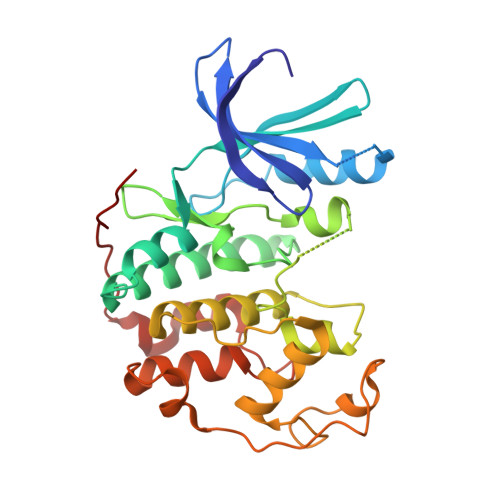Oxindole-based inhibitors of cyclin-dependent kinase 2 (CDK2): design, synthesis, enzymatic activities, and X-ray crystallographic analysis.
Bramson, H.N., Corona, J., Davis, S.T., Dickerson, S.H., Edelstein, M., Frye, S.V., Gampe Jr., R.T., Harris, P.A., Hassell, A., Holmes, W.D., Hunter, R.N., Lackey, K.E., Lovejoy, B., Luzzio, M.J., Montana, V., Rocque, W.J., Rusnak, D., Shewchuk, L., Veal, J.M., Walker, D.H., Kuyper, L.F.(2001) J Med Chem 44: 4339-4358
- PubMed: 11728181
- DOI: https://doi.org/10.1021/jm010117d
- Primary Citation of Related Structures:
1KE5, 1KE6, 1KE7, 1KE8, 1KE9 - PubMed Abstract:
Two closely related classes of oxindole-based compounds, 1H-indole-2,3-dione 3-phenylhydrazones and 3-(anilinomethylene)-1,3-dihydro-2H-indol-2-ones, were shown to potently inhibit cyclin-dependent kinase 2 (CDK2). The initial lead compound was prepared as a homologue of the 3-benzylidene-1,3-dihydro-2H-indol-2-one class of kinase inhibitor. Crystallographic analysis of the lead compound bound to CDK2 provided the basis for analogue design. A semiautomated method of ligand docking was used to select compounds for synthesis, and a number of compounds with low nanomolar inhibitory activity versus CDK2 were identified. Enzyme binding determinants for several analogues were evaluated by X-ray crystallography. Compounds in this series inhibited CDK2 with a potency approximately 10-fold greater than that for CDK1. Members of this class of inhibitor cause an arrest of the cell cycle and have shown potential utility in the prevention of chemotherapy-induced alopecia.
Organizational Affiliation:
GlaxoSmithKline Inc., Five Moore Drive, Research Triangle Park, North Carolina 27709, USA.















